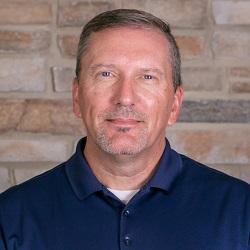Back in June, lenders from five credit unions of diverse size and geography talked with CreditUnions.com about what was then a global pandemic. Now, we know it was only the beginning of a long-lasting health and economic crisis.
The result was a piece titled Lending Pros Share Pandemic-Fueled Lending Lessons.
As the United States enters the second year of the pandemic, these leaders talked again with CreditUnions.com to offer insights on what they’ve learned and how they’ve put those learnings into action.
Here’s what they said.
Notre Dame Federal Credit Union

Tom Gryp, President and CEO, Notre Dame Federal Credit Union
Tom Gryp joined Notre Dame FCU ($855.5M, Notre Dame, IN) as its president and CEO in September 2010.
Do you have deferral programs or other special arrangements in place for members?
Tom Gryp: We’re still offering deferral programs; however, the quantity of inquiries has dropped significantly since the beginning of the pandemic. At the end of the year, less than one-half of 1% of our entire loan portfolio was in some form of deferral status, with that number declining steadily each month. Fortunately, nearly all of the loans coming out of deferral are returning to their normal payment schedule without any issues. So as far as we are concerned, the deferral efforts have achieved their intended goal.
What have you learned in the past year that you’re building on in 2021?
TG: The lessons are common sense in nature, but it’s still nice to see validation during this crisis.
Lesson No. 1: Be proactive with your members. Reach out to them before they reach out to you.
Lesson No. 2: Really and I mean really put your members’ interests first, not your own. When our members win, we win. Trust is a rare and precious commodity that must be earned by actions, not words. When members and the credit union trust each other, everyone is better for it. We are seeing this each and every day of this pandemic.
What are the biggest challenges and opportunities in your market for loan products?
TG: The opportunities have not changed. Opportunities always exist if you’re faster than your competitors in identifying needs and being the first to provide solutions that meet those needs.
The challenges are the same as well, with the biggest being ourselves. Too many of us are trapped in our own paradigms of how we see ourselves and our organizations and what we can or should do.
The second challenge is speed to market. We can only create new products at the speed set by our own creativity and our core provider’s ability to bring those products to life. We’re fortunate that our core provider, CU*Answers, is a credit union-owned cooperative that has tools that allow us to bring new products to market scary fast. That allows us to connect our desire to solve a member problem with the ability to get it done.
Bonus question: What impact has your work during the pandemic had on members?
TG: Obviously, our members know that answer better than us. All we can do is keep trying and adjusting, hoping what we do is enough. However, it still comes back to trust. If our members trust us and we trust them, we’ll make more correct decisions than mistakes, and we will help more than we hurt.
At the end of the day, we’re all human beings trying to make our way through uncharted waters. The best we can do is be honest with each other and try to do what is right each and every day. If our members see this and believe in us, then we are doing all we can as their financial cooperative.
Trailhead Federal Credit Union

Abby Stage, VP of Lending, Trailhead FCU
Abby Stage joined Trailhead FCU ($140.8M, Portland, OR) in 2008 and has been vice president of lending since January 2020.
Do you have deferral programs or other special arrangements in place for members?
Abby Stage: Over the summer, Trailhead worked with Business Oregon and three partner credit unions to deploy grants to small businesses across the state, with a focus on providing financial support to minority and women-owned sole proprietorships. Many of these businesses have experienced discernable disadvantages and did not qualify for PPP or EIDL funding. The grants alleviated some of their fiscal burdens brought on by the pandemic.
Currently, our focus is to help members via loan modification and payment deferrals to offer financial stability and relief during this difficult time. We consider several creative solutions in various scenarios to help our members while ensuring the overall health of the credit union.
What have you learned in the past year that you’re building on in 2021?
AS: Being nimble and having the ability to pivot and adapt to unknown, outside factors is crucial. Whether it’s rolling out a new loan product, reducing interest rates, or keeping up with the ever-changing regulations we have to be able to make changes quickly.
Playing to our lending strengths, improving technologies and lending accessibility, and making informed decisions on economy trends also helps form our lending strategies in 2021 and beyond. Operationally, the same balance between flexibility and educated foresight is critical to our strategic planning efforts.
What are the biggest challenges and opportunities in your market for loan products?
AS: Our biggest challenges as a small credit union are keeping up with technology. We will continue to leverage our small enough to know better mantra and focus on serving our membership in areas where we can thrive while also refining and enhancing our technology and delivery channel options.
We’ve reimagined some of our marketing and outreach approaches as the pandemic continues and will be updating our online and mobile banking applications during 2021 to accommodate members in this irregular landscape.
Clark County Credit Union

Josh Haldeman, CLO, Clark County Credit Union
Josh Haldeman has been with Clark County Credit Union($980.4M, Las Vegas, NV) since September 2014 and has been its chief lending officer since May 2018.
Do you have deferral programs or other special arrangements in place for members?
Josh Haldeman: CCCU is not offering any broad-based deferral programs going forward. We were very generous early in the pandemic we allowed many of our borrowers to skip up to five loan payments during 2020. We know there are people in need in our community, but we need limits to protect the credit union and our 47,000 members who trust us with their finances.
Federal and local assistance programs, plus our generous skip policy, helped many of our members stay on their feet; but, going forward, we owe it to the 70-year legacy of CCCU to maintain capital ratios and understand where our loan portfolio stands. We still believe in the credit union motto of people helping people. Any member that wants to keep their home or car can complete a hardship package with CCCU. Depending on their financial condition, they might qualify for a permanent loan modification. Those would be on an individual basis.
What have you learned in the past year that you’re building on in 2021?
JH: One of the biggest things we have learned is that a credit union is a vital part of the community and genuinely helps people stay in their home and or car. I’ve also learned it’s better coming into a challenging economic environment with a strong balance sheet. We’re fortunate to have strong capital that has allowed us to help our members. CCCU also has a diverse borrowing base with strong commercial lending, mortgage lending, and consumer lending. Despite the increase in unemployment in our region, we approved more consumer loans in 2020 than we did the previous year.
Unfortunately, we also learned we need to stay diligent with verification of income and underwriting practices, especially during tumultuous times. If I could turn back the clock and do things again, I would have changed the way we offered our loan deferrals. Making interest-only payments keeps members more engaged and committed to paying their loans.
What are the biggest challenges and opportunities in your market for loan products?
JH: The challenge any credit union faces in lending is finding the balance between offering members value-driven rates while mitigating overall interest rate risk to protect the cooperative.
This past year was a challenging year for our community. There was and continues to be a lot of uncertainty around employment, which can naturally cause lenders to become more constrictive in their lending practices.
These market conditions drove us to examine our lending practices. Although we were at times cautious in our approach, it was important to us to stand up for our members and continue to lend during these unprecedented times. We expect the challenges of 2020 will reverberate throughout the first half of 2021. In spite of those challenges, we maintain our commitment to meeting market demand.
We’ve also been able to seize the opportunity to grow our commercial lending portfolio. While a lot of the banks have run for cover, we’ve been able to find businesses that are profitable with good collateral, and we’re helping them meet their needs.
Bonus question: What impact has your work during the pandemic had on members?
JH: I believe CCCU made a big impact in our local community of Southern Nevada with our COVID response and agile lending policies. Between March and December, we offered skip payments on 2,899 loans totaling 6,503 loan skips. We waived $4,354,751.07 in total payments during that time. We also waived more than $160,000 in loan skip fees.
We also maintained our charitable giving strategy, even while nonprofits had to greatly modify their fundraising efforts. CCCU also reached out to our members with some assistance during the holidays, paying up to $1,500 off credit card purchases for five lucky winners. The winners sent us messages of thanks and we learned many had fallen on hard times. Selecting our winners randomly led us to a member whose spouse had lost their job and a member who was facing expenses for a family member’s funeral.
We’ve also heard from our members grateful that our lobbies have remained open at all of our branches while other financial institutions have dramatically limited their hours or locations.
Commodore Perry Federal Credit Union

Mike Barr, President and CEO, Commodore Perry FCU
Mike Barr has been with Commodore Perry FCU ($56.7M, Oak Harbor, OH) since 2003 and at the helm since 2008.
Do you have deferral programs or other special arrangements in place for members?
Mike Barr: We continue to make use of payment deferrals as needed, but the need significantly decreased over the last few months of 2020.
What have you learned in the past year that you’re building on in 2021?
MB: We’ve significantly shifted to working from home. We had remote work technology in place before the pandemic, but we expanded its use as a necessity during 2020. Most surprisingly, we found little to no disruption as a result. We’ll be looking for ways to leverage the benefits of remote work even as we leave the pandemic period.
What are the biggest challenges and opportunities in your market for loan products?
MB: As a result of the low interest rate environment, combined with increasing home values, there has been significant movement in the housing market. We’ll be looking for ways to improve and expand our mortgage offerings to meet the increased demand.
Bonus question: What impact has your work during the pandemic had on members?
MB: We’ve always made decisions on an individualized understanding of the members’ circumstances, understanding that blanket risk-based policies often don’t always identify appropriate risks and opportunities. During the pandemic, we amplified this approach to ensure we help as many members as possible. We continue to hear feedback from our members, one of whom stated, If you could, convey my deepest gratitude to those who helped facilitate and make exceptions for me. I know I seemed like a risk. I’m not, but sometimes things look a lot different on paper than they really are.
Mazuma Credit Union

Dan Engelhard, CLO, Mazuma Credit Union
Dan Engelhard has been with Mazuma Credit Union($810.9M, Overland Park, KS) for 20 years and its chief lending officer since 2012.
Do you have deferral programs or other special arrangements in place for members?
Dan Engelhard: Our pandemic support programs are continuing. We implemented a disaster skip-a-pay program for our retail loans that allows borrowers to skip up to three payments. We also have a 0% CD-secured loan to help members access their money without having to cash in their CDs. We’re following GSE guidance for mortgage forbearance, even on portfolio and non-conforming mortgage loans. We’ve provided payment assistance offerings for our existing small business banking members, and we’ve helped more than 200 small businesses in the Kansas City area with PPP loans. We’ve seen the demand for assistance programs trend down recently, but there are still many members we’re continuing to assist.
What have you learned in the past year that you’re building on in 2021?
DE: We’ve experienced an ongoing demand for loans. Many members also need assistance, maybe not in the form of new loans but in the form of existing loans.
We’ve also learned the members’ story is more important than ever. Understanding their needs and listening to their story is important to get them the right assistance. We believe we’ve always done a pretty good job at listening, but this environment gives us the opportunity to do that even better and further distinguish ourselves.
What are the biggest challenges and opportunities in your market for loan products?
DE: The challenge remains to operate effectively in an extended remote work environment. Opportunities in all lending channels still exist. Mortgage activity remains at record levels; another round of PPP funds is at hand, with opportunities to help more small businesses; and retail lending, while well below record levels, remains steady and in positive growth territory.
The biggest opportunity is to consistently serve our members in their times of need.
These interviews have been edited and condensed.